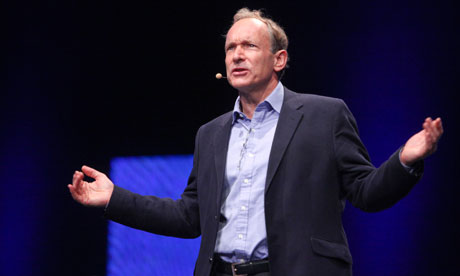Tim Berners-Lee: Facebook can fragment the Web
One of the founders of the World Wide Web believes that "the most successful social networks are beginning to change the fundamental principles" of the Internet and "create closed storage of content." Sir Tim Berners-Lee has published a large article on this subject in Scientific American.
According to him, not allowing users to export information, these social networks can lead to the "collapse of the Network into separate islands." He cited Facebook as an example, which left 600 million of its users in a “data deadlock,” a trap from which they could not get out. Here Berners-Lee almost literally repeats the expression of Google .
Recall that Tim Berners-Lee invented the technology of URI, URL, HTTP, HTML and WWW. In 2004, knighted. He is also the author of the concept.semantic web and sincerely believes that it should be "the next step in the development of the World Wide Web." This idea is being actively promoted by the W3C Consortium, which he leads.

Berners-Lee believes that fragmenting the Network is threatened not only by Facebook, but also by other social networks like LinkedIn, as well as large telecoms. But it seems that the arrows of criticism are directed primarily against Facebook in the light of the war over the social graph flaring up with Google . Obviously, in this fight, Berners-Lee’s sympathies are with Google.
In his article, Knight KBE also criticizes manufacturers of isolated mobile applications, as in Apple iTunes. According to him, “the world of iTunes is centralized and surrounded by a wall. You are trapped in a single store instead of being in the open market. Despite all the wonderful features of this store, its evolution is limited by the inventions of a single company. ”
“Other companies also create closed worlds. What worries, for example, is the trend of magazines to produce “apps” for smartphones instead of web apps, because in this way the material leaves the Web. ”
Tim Berners-Lee also defended the principle of network neutrality.
According to him, not allowing users to export information, these social networks can lead to the "collapse of the Network into separate islands." He cited Facebook as an example, which left 600 million of its users in a “data deadlock,” a trap from which they could not get out. Here Berners-Lee almost literally repeats the expression of Google .
Recall that Tim Berners-Lee invented the technology of URI, URL, HTTP, HTML and WWW. In 2004, knighted. He is also the author of the concept.semantic web and sincerely believes that it should be "the next step in the development of the World Wide Web." This idea is being actively promoted by the W3C Consortium, which he leads.

Berners-Lee believes that fragmenting the Network is threatened not only by Facebook, but also by other social networks like LinkedIn, as well as large telecoms. But it seems that the arrows of criticism are directed primarily against Facebook in the light of the war over the social graph flaring up with Google . Obviously, in this fight, Berners-Lee’s sympathies are with Google.
In his article, Knight KBE also criticizes manufacturers of isolated mobile applications, as in Apple iTunes. According to him, “the world of iTunes is centralized and surrounded by a wall. You are trapped in a single store instead of being in the open market. Despite all the wonderful features of this store, its evolution is limited by the inventions of a single company. ”
“Other companies also create closed worlds. What worries, for example, is the trend of magazines to produce “apps” for smartphones instead of web apps, because in this way the material leaves the Web. ”
Tim Berners-Lee also defended the principle of network neutrality.
